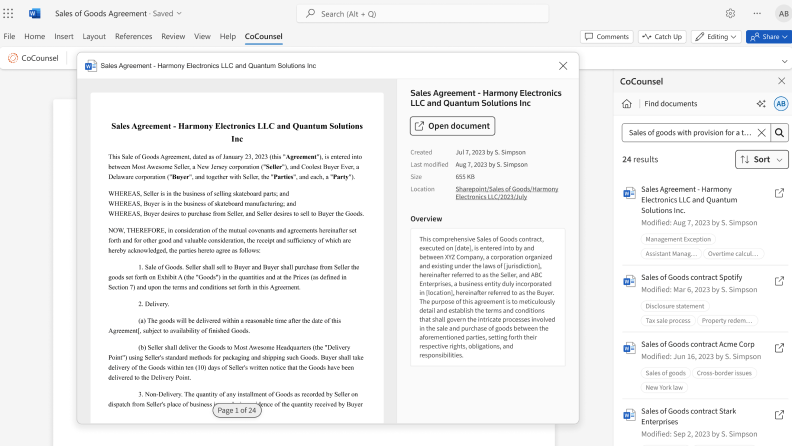How AI connects all the dots from legal research and document analysis to drafting. CoCounsel Legal is that single, seamless solution.
Highlights
- CoCounsel Legal combines GenAI and agentic AI for research, document analysis, and drafting workflows.
- Legal professionals using GenAI increased from 14% in 2024 to 26% in 2025.
- Professional-grade AI tools offer 98% accuracy with robust security and compliance safeguards.
Have you stared at a mountain of work in the face and your honest response was something along the lines of:
- “I wish my firm had enough legal assistants so I could get this done today,” or,
- “Can’t I outsource any of this to various AI tools?” and,
- “AI isn’t magic. I’d still need to do the hard part of the work, right?”
Artificial Intelligence (AI) is definitely not a magic wand. The skills and knowledge you’ve built as a lawyer are still your most valuable asset.
However, that doesn’t mean you need to do everything the hard way —in fact, you have an ethical obligation as a lawyer to maintain technological competence and understand where AI can support and augment your work.
While lawyers absolutely must master the legal principles and nuances of their practice, AI can dramatically amplify their capabilities and provide AI-work-life balance. Read further to learn how legal professionals can safely sit on the cutting-edge with easily verifiable information, rock-solid security, and extensive data privacy safeguards.
Jump to ↓
Core functionalities and application examples
What is the best legal AI tool?
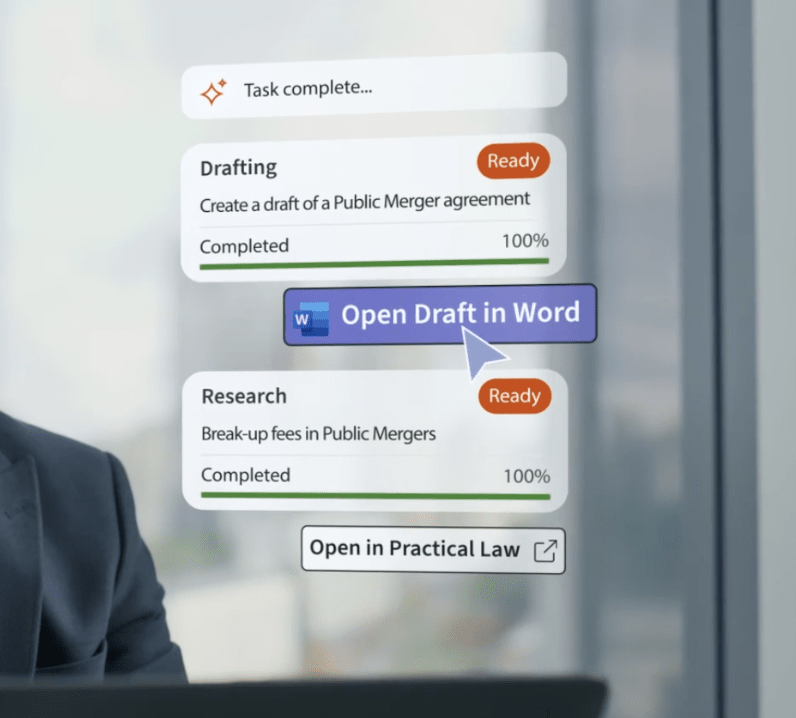
CoCounsel Legal
Bringing together AI, trusted content, and expert insights
Your all-in-one AI solution ↗
What is legal AI?
CoCounsel Legal is the professional-grade AI solution from Thomson Reuters that brings generative AI (GenAI) and agentic AI capabilities for legal research, document analysis, and drafting into a single, seamless, AI-powered workflow. It handles a variety of legal tasks across Thomson Reuters products, Microsoft 365, and document management systems (DMS) partners.
The intersection between AI and law produced a need for overarching guidance to navigate such profound AI shifts in legal technology.
According to the 2025 Generative AI in Professional Services Report, the portion of professionals saying their workplaces are already using GenAI throughout the organization has nearly doubled within the past year.
In 2025, more than 40% of professionals said they already are using publicly available tools such as ChatGPT, and the use of industry-specific tools is expected to rise within the next few years.
Among legal professionals, 26% are already using GenAI compared to 14% in 2024, indicating major efficiency and productivity gains in legal practice
Already using GenAI technology, year-over-year
|
|
| Total | 12% 22% |
| Legal | 14% 26% |
| Tax accounting & audit | 8% 21% |
| Corp risk | 18% 21% |
| Government | 11% 13% |
What are the core applications of AI?
CoCounsel Legal delivers more core functionalities and applications than any other AI legal solution:
- Harnesses both GenAI and agentic AI — GenAI is technology that generates outputs in response to inputs whereas agentic AI plans, decides, and performs in response to inputs
- Plans and then carries out the best steps for a given project at your request by using expert-created agentic workflows
- Its Library takes the guesswork out of prompting so you can reach final results faster
With CoCounsel Legal, you can conduct legal research, draft documents through thorough analysis, and provide strategic advice.
Conduct legal research
Conduct thorough, accurate research faster than ever.
Reliable AI systems enhance legal research by rapidly identifying and synthesizing relevant authorities in Westlaw and Practical Law content.
Thomson Reuters provides attorneys with the confidence that AI-generated answers are thoroughly supported by essential facts and legal precedent, ensuring reliability in complex cases.
Partner, Larson LLP
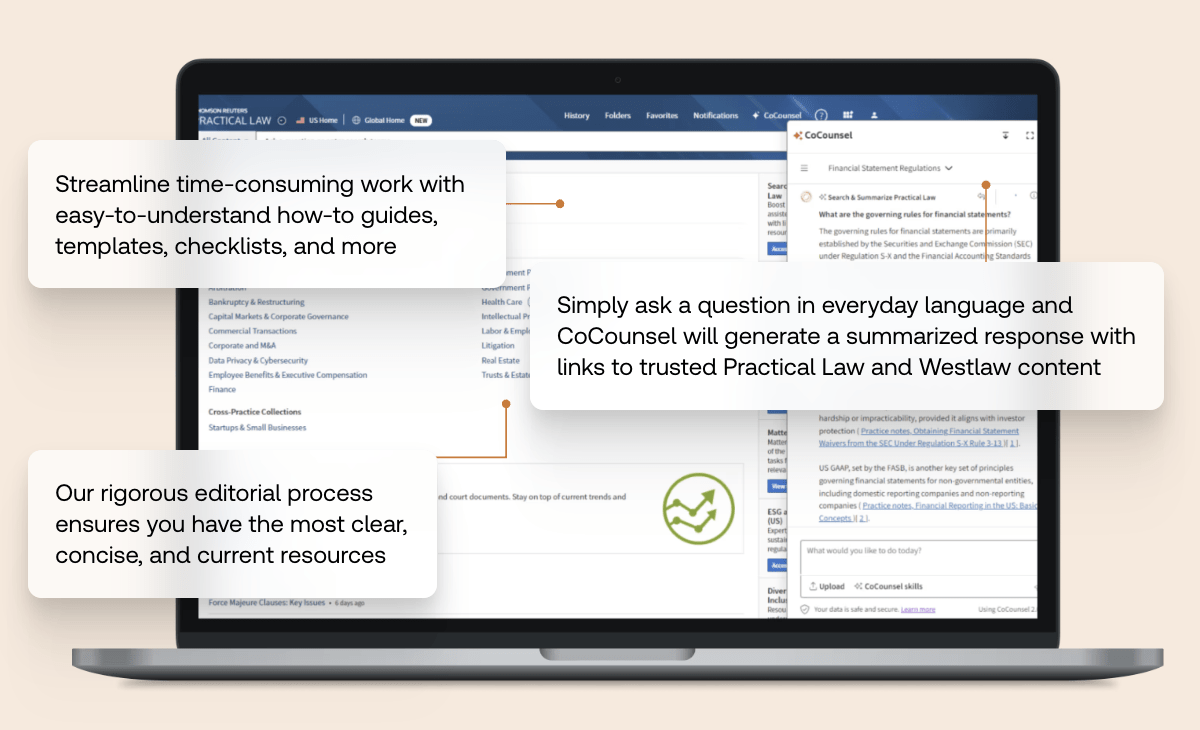
Communicate with natural language processing in law by using Cocounsel Legal’s Deep Research to plan and execute complex legal research. Using Westlaw’s vast legal content and core tools, such as KeyCite and Key Number System, its detailed insights and recommendations empower you to move forward faster, confident that your results are thorough and accurate.

You’re able to gain real-time insight into how results are generated with step-by-step research notes and clarifying questions where additional information can produce an even more accurate answer.
CoCounsel Legal’s research features continue to be governed by human-in-the-loop oversight for safety, accuracy, and accountability even with the addition of agentic AI capabilities.
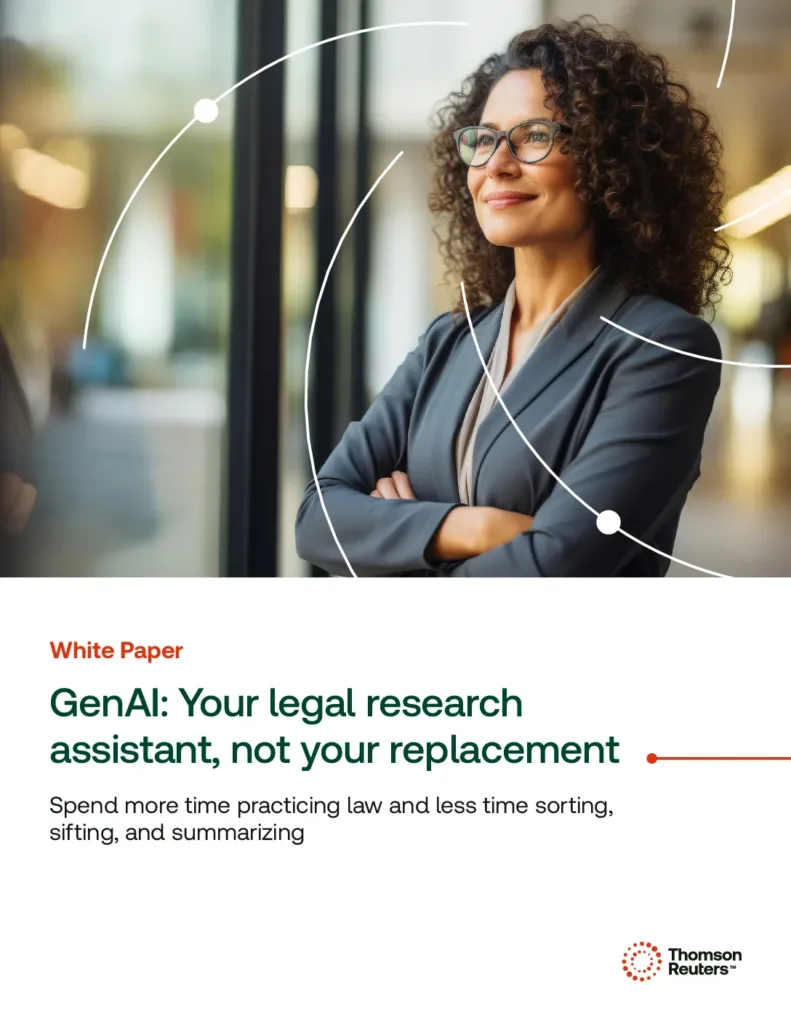
White Paper
Spend more time practicing law and less time sorting, sifting, and summarizing with the power of generative artificial intelligence (GenAI)
Access white paper ↗Analyze documents
CoCounsel Legal’s versatile document analysis capabilities help lawyers review information of all kinds, quickly surface actionable insights, and find the needle in the haystack among millions of pages.
It can answer complex questions about documents, compare and contrast them, provide tailored summaries, search vast databases, analyze arguments, and even detect mischaracterizations.
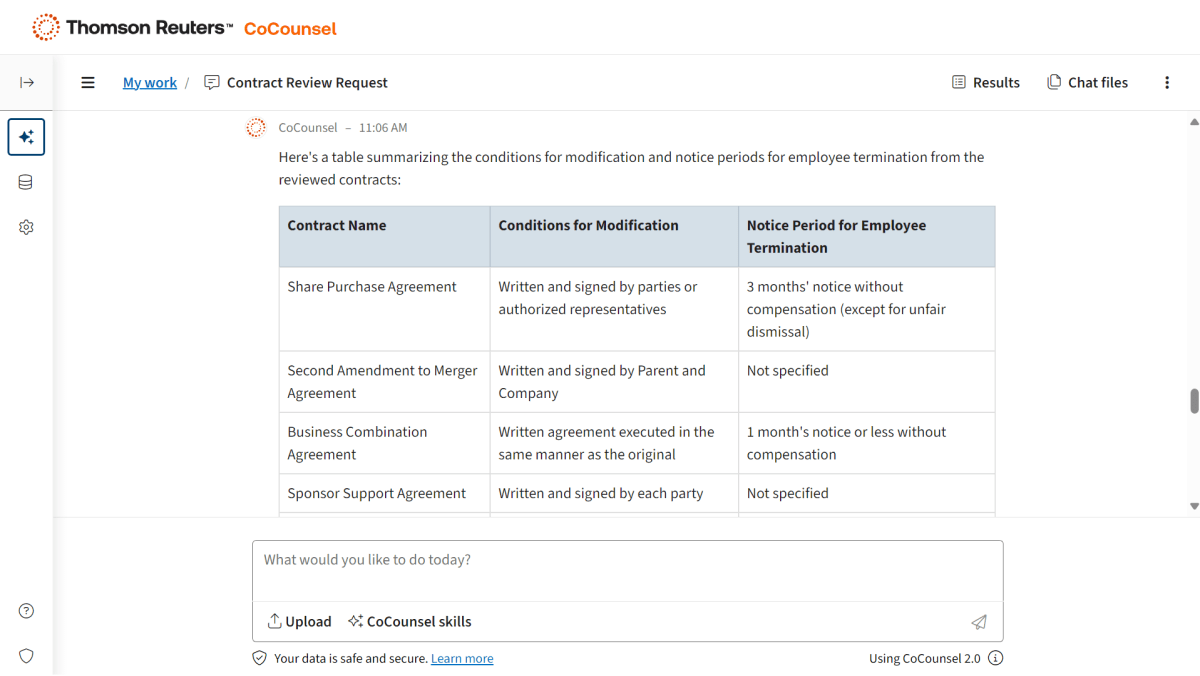
It can take a person one to four hours to review 100 pages of material, depending on the level of redaction and e-discovery coding. CoCounsel Legal can read and analyze a hundred pages in their entirety and answer complex questions about them in three minutes.
Mergers and acquisitions (M&A), for example, is a monumental and tedious task that can use some aspects of due diligence automation. Legal teams can focus on more valuable tasks that only a person can handle — the job you were trained to do and the job you enjoy doing.
One knowledge management counsel in an AmLaw 200 firm used CoCounsel and told us, “When I was a junior associate doing M&A contract due diligence, I remember spending so much time in the data room doing manually what CoCounsel can do in minutes. [This is] really amazing stuff!”
Find the needle in the haystack among millions of pages and rapidly distill complex information. Easily verify results of CoCounsel Legal, which cite sources.
One litigation managing attorney told us that “CoCounsel helps improve the quality of our representation. It finds things in 2,000- page police reports and transcripts that humans miss. And it doesn’t just read, it interprets — that’s the game-changer.”
I’ll have a summary that’s near perfect and a timeline that outlines every significant event contextually in less than seven minutes. It saves us weeks!
Partner, Laffey Bucci D’Andrea Reich & Ryan
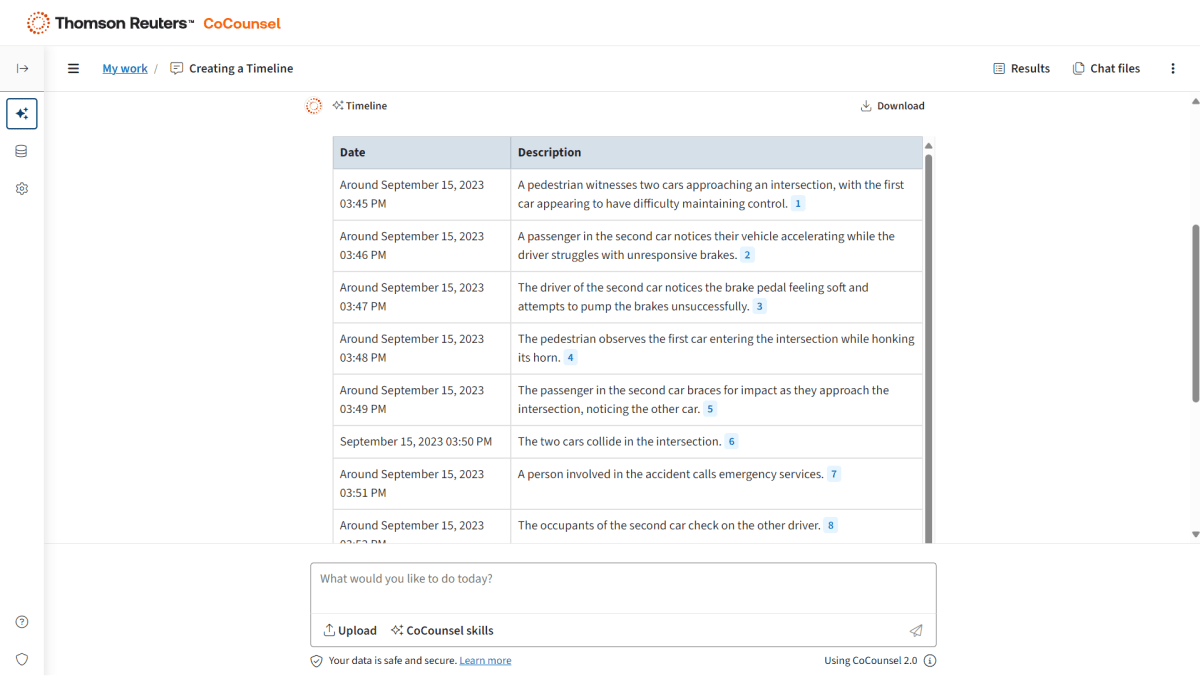
Draft documents
Create a range of documents, from contracts to deposition outlines, more quickly.
Need to find the best starting points with trusted contract language and legal document templates? According to Thomson Reuters research, lawyers can spend up to 56% of their time drafting documents, and they take more than 15 minutes just to find a good starting point for their draft.
Deliver drafting consistency with document drafting software automation and contract playbooks. Apply trusted Westlaw and Practical Law content and easily reference prior work product, directly within Microsoft Word.
When we are operating on an average turnaround time of three to four business days for a response, we can cut that down to one to two business days by utilizing the tool to get drafting work done.
Legal Counsel at Systemiq

White paper
AI-powered legal drafting: The definitive guide for legal professionals
Access white paper ↗Strategize and advise
Finally, free up you time for the creative and critical thinking, strategic planning, and relationship-building needed to better serve your clients, sharpen your practice, and grow your business
CoCounsel Legal helps you practice with confidence as you make informed decisions based on accurate and reliable insights from Practical Law.

Accuracy, ethics, and trust
Repetitive and manual processes are prone to human error and can introduce an unnecessary element of risk. AI solutions developed and backed by expert human oversight for accuracy in legal work give you a competitive edge and reduces risk.
We’ve found that AI can do some routine tasks even more accurately than a human can, and in less time.
For instance, extracting key obligations for 2,000 contracts can take more than 80 hours and is prone to a human error rate of 10-20%. To mitigate inaccurate responses, CoCounsel Legal can extract contract data with at least 98% accuracy.
However, using AI in legal work raises significant ethical concerns. Attorneys must ensure they fully understand the technology they use as required by their duty to provide competent representation.
Law firms can be reticent to turn on some AI features because they want to be sure about what they’re going to do. There’s a need to have confidence in how those solutions are being delivered.
Director of AI Strategy and Partnerships, Thomson Reuters Labs
They must stay up to date on technological advancements and understand the benefits, risks, and responsible use of AI such as the ISO/IEC 42001:2023 certification standard for AI management systems.
Ethical responsibility and accuracy are critical when it comes to building and maintaining trust in a professional-grade AI solution for the legal workforce.
The AI landscape is transformed with CoCounsel. The power of this technology, deployed in a product that is secure and reliable, is a huge leap forward.
Director of Research & Knowledge Services, Eversheds Sutherland

On-demand webinar
Unlocking innovation in law: The future of professionals with strategic AI adoption
Watch on-demand ↗What is the best legal AI tool?
Guided research for a trusted AI solution begins with asking the difference between a professional-grade and consumer-grade tool.
| Feature | Consumer-Grade GenAI | Professional-Use GenAI |
|---|---|---|
| Focus | General-purpose | Domain-specific |
| Data | Broad, unfiltered internet data | Curated, high-quality professional data |
| Accuracy | Variable, prone to errors | High, minimized errors |
| Security | Lower | Robust |
| Compliance | Limited | Designed for specific industry regulations |
| Customization | Limited | Extensive |
| Support | Limited | Dedicated |
A public, free, or general-use, AI tool such as ChatGPT by OpenAI is infamous for making up fabricated answers because they do not have the proper guardrails.
Popular consumer-grade large language models such as OpenAI’s GPT series, Anthropic’s Claude, Microsoft’s Copilot and Google Gemini each feature distinct architectures and training methodologies.
Thomson Reuters is leading the way in responsible AI innovation with the launch of the Trust in AI Alliance — a first‑of‑its‑kind collaboration with industry leaders like Anthropic, Google, OpenAI, and AWS — uniting top experts to build AI systems that are trustworthy, accountable, and engineered for high‑stakes professional work.
Using general purpose LLMs on their own presents challenges — in addition to the need for trusted sources of data, professionals need to extensively test the output and validate answers, which is challenging when the LLM does not cite its sources. Since general purpose LLMs don’t connect to everyday software tools like Microsoft Outlook or Westlaw, they contribute to silos.
However, if you work with a professional-grade solution that only draws on authoritative content and expertise of Westlaw and Practical Law as CoCounsel Legal does, then you can proceed with greater confidence.
More than 40% of survey respondents said they have used publicly available GenAI tools for work. Fewer have cited using paid industry-specific GenAI solutions, but many expect this usage to increase dramatically within the coming years.
Personal GenAI use by type of tool
|
|
|
| Already use | 41% 17% 9% |
| Planning to use | 6% 17% 14% |
| Considering whether to use | 19% 33% 23% |
| Firm/department has no plans to use | 25% 19% 33% |
| Unsure/not my responsibility | 10% 14% 22% |
Source: 2025 Generative AI in Professional Services Report
Now decision-makers in legal organizations must perform thorough due diligence on legal-specific AI solutions to determine the legal data used to generate responses.
Don’t settle with generic and vague references to sources such as:
- “domain-specific content”
- “legal database”
- “legal text”
You’re a lawyer — ask the questions required in due diligence to clarify what kind of domain-specific, legal information is used. It’s a wise and foundational distinction to make.
Explore Reddit articles, customer testimonials, our AI in legal tech buyer’s guide, and use AI search tools such as ChatGPT and Google Gemini to quickly analyze options. The research pays off. Set your team up for success and be confident that outputs for certain legal services are more trustworthy and accurate than other AI solutions. Thomson Reuters goes even further with transparency in benchmarking performance for its AI capabilities such as legal research performance.
We also track long context benchmarks of other LLMs to ensure we are using the latest and most advanced models. Benchmarks, however, come with an important caveat: they should measure products as they are intended to be used and focus on outcomes that are significant to customers.
The value of legal AI — of any technological innovation for that matter — is in how it gets used in the real world and how well all the different components come together to help lawyers do their jobs more effectively.
President, Legal Professionals, Thomson Reuters
Testimonials
CoCounsel is already in use by over 20,000 law firms and legal departments because it’s enabling a fundamental and beneficial shift in how legal work gets done.
- 80% of Am Law 100 have CoCounsel
- Courts across the US federal court system—including the Supreme Court, circuit courts, and federal public defenders—as well as courts in 94% of US states have CoCounsel
The following case studies highlight the incredible work of attorneys augmented by AI.
CoCounsel levels the playing field and gives us a huge competitive advantage, especially against other defense firms that aren’t using it.
Shareholder, Zarwin Baum

Laffey Bucci D’Andrea Reich & Ryan
Partner Guy D’Andrea at Laffey Bucci D’Andrea Reich & Ryan shares the tangible benefits of using Thomson Reuters CoCounsel
Read case study ↗It allows you to hyper-focus on that incredibly important skill set — and less on the everyday monotony of what we sometimes do in the practice of law.
Partner, Laffey Bucci D’Andrea Reich & Ryan

Bochetto & Lentz, P.C.
David Heim and Kiersty DeGroote share how CoCounsel helps speed up work and deliver stronger results
Read case study ↗We knew that Westlaw had the database we needed. We knew it had the cases we needed. We knew there were tools already useful to us. So, when CoCounsel merged with Westlaw, it just made perfect sense to continue to use those products together.
Associate, Bochetto & Lentz, P.C
Read more customer stories.
How to use CoCounsel Legal
Check out the resources below to begin your evaluation of legal AI using CoCounsel Legal.
- Access the Legal Learning Hub, for in-depth, free e-learning courses in crucial areas like drafting, legal research, and business development.
- Join the AI for Legal Professionals Community where you can immerse yourself in the progressive changes, ideas, and learnings that are reshaping the legal landscape.
- Or contact a representative to schedule a free demo and experience the full potential of CoCounsel Legal


